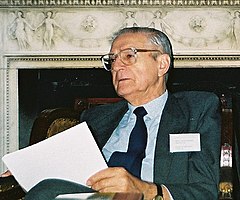Aleksander Gieysztor
Appearance

Aleksander Gieysztor (17 July 1916, Moscow, Russian Empire – 9 February 1999, Warsaw, Poland) was a Polish medievalist historian.
Life
Aleksander Gieysztor was born in Moscow to a Polish family. He lived in Warsaw since the age of five. He graduated in history from Warsaw University in 1937.
He was married to Irena Gieysztorowa, a fellow historian.
The Aleksander Gieysztor Prize of the Kronenberg Foundation and the Aleksander Gieysztor Academy of Humanities are named after him.
Awards
- 1944: Silver Cross of the Order Virtuti Militari
- 1961: Legion d'Honneur
- 1980: The Order of Merit of the Federal Republic of Germany
- 1994: Order of the White Eagle[1]
- 1993: Commander's Cross with Star of the Order of Polonia Restituta[2]
- 1999: The Commander's Cross of the Order of Merit of the Italian Republic
Books
Historia Polski (współautor; 1947) Ze studiów nad genezą wypraw krzyżowych (1948) Zarys nauk pomocniczych historii (1948), a textbook used by a lot of generations of Polish students Zarys dziejów pisma łacińskiego (1972) Zamek Królewski w Warszawie (1973) Mitologia Słowian (1982), pierwsza znacząca praca od czasów Aleksandra Brücknera (wyd. Wydawnictwa Artystyczne i Filmowe, 1982 i 1986, w serii Mitologie Świata, ISBN 83-221-0152-X). Dzieje Mazowsza do 1526 roku (wraz z Henrykiem Samsonowiczem) La Pologne et l’Europe au Moyen Age. Warszawa, P.W.N. Conférence au Centre Scientifique Parisien de l’Académie Polonaise des Sciences le 10 décembre 1962. Società e cultura nell’alto Medioevo Polacco. Ossolineum 1965. Conférence à l’Académie Polonaise des Sciences à Rome le 5 novembre 1963.
See also
References
- ^ M.P. 1994 nr 35 poz. 290, A 1994 President's decree on granting the Order to Geysztor, "for extraordinary actievements in educational and social activities
- ^ M.P. 1993 nr 17 poz. 148, A 1993 President's decree on granting the Order to Geysztor, for exceptional merit for Polish science and culture
Categories:
- Polish historians
- Recipients of the Order of Polonia Restituta
- Commanders Crosses of the Order of Merit of the Federal Republic of Germany
- 1916 births
- 1999 deaths
- 20th-century historians
- Researchers of Slavic religion
- Presidents of the Polish Academy of Sciences
- Corresponding Fellows of the Medieval Academy of America
- Polish people stubs
